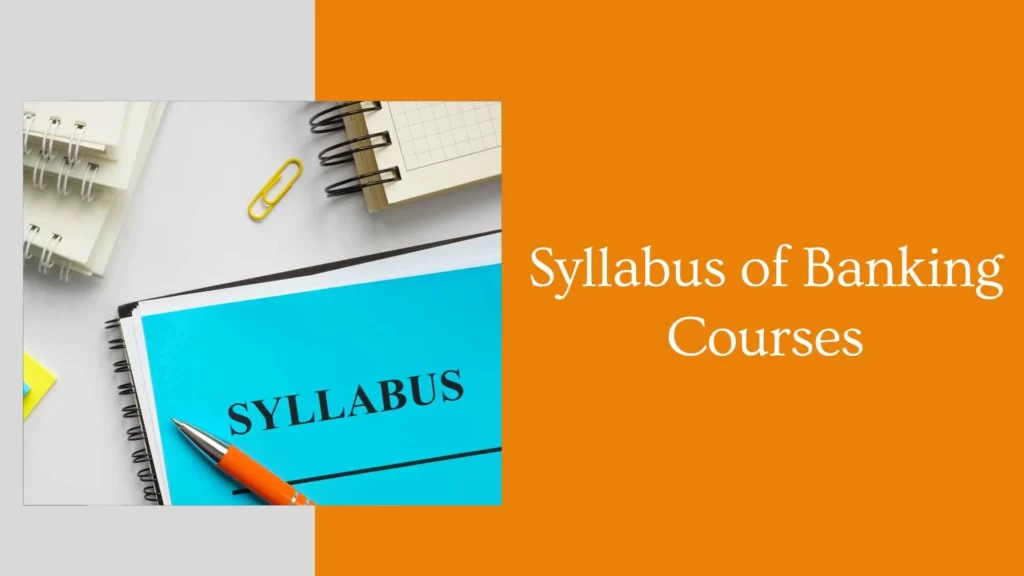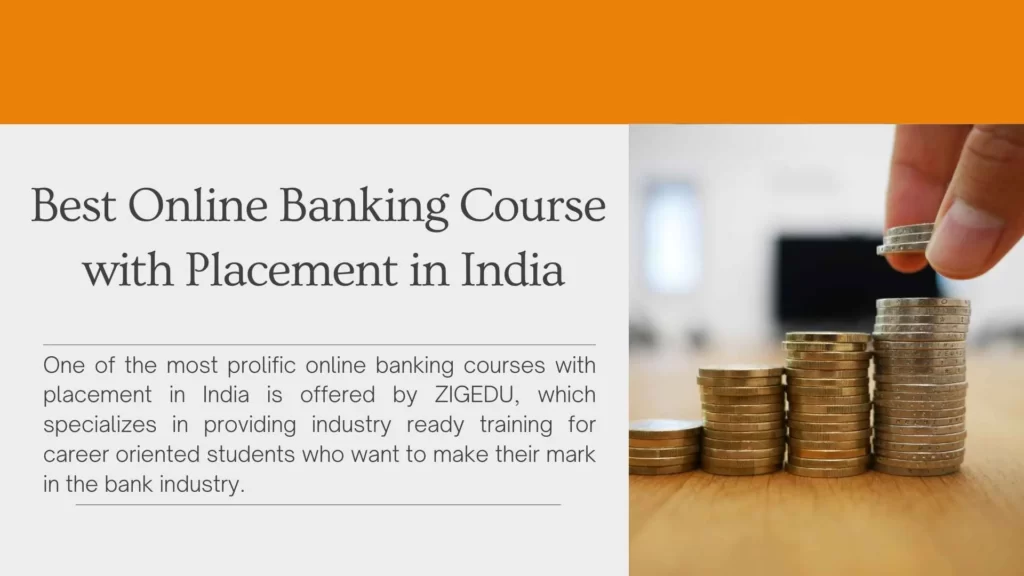Introduction
Are you interested in a career in banking course with placement? If so, an introduction to banking courses may be the ideal choice for you. These courses provide you with the skills and knowledge required to build a successful career in this field. Many of these courses include placement opportunities, allowing you to gain hands-on experience while working alongside experts in the industry.
An introduction to banking course with placement provides you with a comprehensive overview of this industry, covering topics such as different types of financial institutions, financial regulations, investment strategies and banking operations. You will also learn how to read financial statements and interpret economic data, as well as gain an understanding of customer service principles.
These courses also cover important topics such as ethics and personal finance management. While learning about these concepts, students have the opportunity to apply their knowledge through case studies and simulations. By participating in practical activities such as these, students can hone their problem-solving skills and develop their professional network in the finance industry.
In addition to traditional classroom teaching methods, many of these courses offer online components and virtual placement opportunities. The online modules allow students to learn at their own pace and have access to additional resources through e-learning platforms or online forums. Virtual placements provide flexible solutions for those who wish to gain experience from home or abroad without having to take time off from work or studies.
If you are looking for a way into the banking industry then an introduction course could be just what you need. With various teaching methods and placement opportunities available, this type, of course, is designed to equip you with the skills required for a career in this sector.
Types of Banking Courses with Placement

Are you looking to gain a career in the banking industry? If so, a banking course with placement may be the right route for you. There are various types of banking courses available to suit your needs, each offering something unique and special that can help you along your career path. Let’s take a look at the different types of banking courses with a placement that is available to help you get started.
The first type of banking course with placement is a Bachelor’s Degree in Banking and Finance. This type of program combines traditional classroom instruction with hands-on experience in finance and investment management. Through this degree program, students learn about financial management and markets, financial planning and taxation, corporate finance, risk management and investing strategies, as well as other topics related to the banking industry.
Upon completion of the degree program, graduates are qualified to work in many areas within the banking field such as investment analysis or bank branch managers.
The second type of banking course with placement is an Associate’s Degree in Banking and Finance. As opposed to a Bachelor’s degree program, an Associate’s degree focuses more on business principles rather than specific financial topics such as investments or securities trading. Students who complete this type of program should expect to gain knowledge in areas like sales and marketing, business planning and operations management, communication skills and customer service techniques – all essential elements for working in any field related to banking.
If you are looking for a more specialized banking course with placement then an accredited diploma or certification course may be right for you. These programs provide instruction on topics like foreign exchange trading, and accounting certifications such as Certified Public Accountant (CPA), and Risk Management Certifications (RM).
Have a look at the best PG Program In Investment Banking with PLACEMENT GUARANTEE
Eligibility for Banking Courses
If you are looking to embark on a career in banking, you may be considering a banking course with placement. Banking courses combine theoretical knowledge and practical skills to ensure that students have a successful transition into the professional world of finance. However, before opting for a banking course with placement, it is important to understand the eligibility criteria.
When it comes to eligibility for a banking course with placement, educational qualifications are an important factor. Depending on the institution and program requirements, applicants may need to have completed certain levels of schooling or higher education qualifications such as an undergraduate degree in finance or economics. banking course with placement is best to check with the particular institution for their specific requirements.
In addition to educational qualifications, some institutions also require applicants to possess certain skills before they can be considered eligible for banking courses with placement. These include strong analytical and problem-solving skills as well as excellent communication abilities and interpersonal skills. Applicants should also be knowledgeable about financial products and services, economic trends, and computer software applications related to the field of banking.
Finally, applicants may also need some degree of experience to be eligible for banking courses with placement. This usually includes relevant work experience in the financial sector or even voluntary work within the same industry. Although appropriate experience is often necessary for entry into many banking courses with placements, those without prior experience can still demonstrate their commitment by participating in internships or taking up extracurricular activities related to finance.
In summary, eligibility criteria for banking courses with placement typically involve having certain educational qualifications and skill requirements such as strong analytical abilities and knowledge of financial products and services as well as some degree of experience in the form of relevant work history or volunteer work within the sector.
Syllabus of Banking Courses

If you’re looking to enter the banking sector and increase your understanding of banking regulations and policies, then enrolling in a banking course with placement could be the right choice for you. This post details the syllabus of such a course, including the objectives, topics, and professional development resources available.
Upon enrollment, in a banking course with placement, you’ll have access to a range of objectives tailored to prepare you for a career in banking. These include guidance on identifying investment opportunities, understanding financial markets, and gaining practical skills for managing customer portfolios. You’ll also be allowed to develop an understanding of banking regulations and policies.
The topics covered during the banking course with placement may include but not be limited to corporate finance, portfolio management, trading principles & strategies, financial analysis & forecasting, investments theory & practice, risk management & derivatives, and hedge funds & private equity. Additionally, you’ll gain insight into core competencies such as financial statement analysis and accounting principles & standards; many courses also focus on topics related to international finance & investments.
The syllabus also provides participants with access to professional development resources which will arm them with essential tools and techniques required for success in the banking sector. These resources are designed to ensure that they can apply their knowledge and skills as soon as possible after completing their studies.
They may include materials such as networking guides, job search advice, market research reports and other relevant industry publications which can be used to support your job application process or CPD needs.
With this comprehensive syllabus in combination with placement opportunities included in many courses, graduates can look forward to confidently entering the world of banking upon completion of their studies.
Also, Give a visit to the best PG Program In Financial Modelling with PLACEMENT GUARANTEE
How to Find Banking Courses
Are you looking for the best banking course with placement in India? If so, you are in the right place. Banking courses are becoming increasingly popular for those looking to break into the world of finance and make their mark. With the right course and placement, you can have a successful career in banking.
In India, many universities offer various banking courses that focus on finance, economics, and management-related topics. But how do you choose one that is best suited to your needs? The answer lies in doing your due diligence on each course. This includes researching the curriculum and program structure, as well as getting feedback from current and former students.
If a placement is also important to you, look out for courses that provide internships or job placements upon completion of their program. Many courses guarantee job placements upon completion, which is great news if you’re looking to kickstart your career in banking right away!
Banking courses are a great way to gain knowledge and skills related to the industry quickly so it’s important to choose one carefully. We recommend checking out universities such as IIM Ahmedabad and BSE Institute Limited for high-quality banking programs with strong placement opportunities.
Best Online Banking Course with Placement in India

The world of banking is a competitive sector and having an online banking course with placement can give you a competitive edge. A quality program should help build your knowledge base on a wide range of topics such as principles of banking, risk management, and financial management. Additionally, these courses often feature lectures by experts in the field as well as virtual internships to give you real-world experience.
One of the most prolific online banking courses with placement in India is offered by ZIGEDU, which specializes in providing industry-ready training for career-oriented students who want to make their mark in the banking industry. The 12-module curriculum provides comprehensive coverage of subjects like business analysis, financial markets analysis and more.
The program also allows interns to work closely with faculty members and receive real-time guidance from mentors throughout their self-paced courses.
Those looking for comprehensive experience can check out SIBM Academy’s Banking & Finance Program, which provides students with a unique blend of theory and practical knowledge with case studies from some of India’s leading banks. This institute offers workshops on topics such as consumer lending, corporate finance and more so that students can apply their learning directly to the job role they are seeking after completing the program.
Finally, those looking for an international perspective can look towards GetSkill Up’s Advanced Financial Modeling & Valuation Course created in partnership with Middlesex University London.
Want to become an investment banker in India? Have a look
Tips to Find the Best Offline Banking Course with Placement in India
With the banking industry booming and countless opportunities for those interested in pursuing a career in banking, having a quality education and good placement prospects is essential.
The best offline banking courses with placement in India can help to provide excellent employment opportunities, as well as prepare individuals for a career in the financial sector. These courses cover all aspects of banking from fundamental concepts to advanced topics and equip students with the knowledge and skills they need to succeed. They include lectures on personal finance management, risk management, investments, and other related topics.
When selecting an offline banking course with placement in India, look for one that offers excellent job prospects within the industry. Ensure that the institution offering the program has an excellent reputation among employers and provides comprehensive training programs. Additionally, make sure that they offer assistance with job applications and work placement after completion of the course.
Along with finding an excellent offline banking course with placement in India, it’s also important to consider additional resources such as online tutorials or study materials. These can help supplement the course material and give students an added advantage when applying for jobs or internships upon completion of the course. In addition to this, research internships or shadowing opportunities related to your chosen profession so you can gain valuable experience in your field of interest.
Benefits of Pursuing Banking Course with Placement

Are you considering a career in banking? Pursuing a banking course with placement may be the right choice for you. This type of program provides greater job security, financial stability, and expertise development that can help you build a successful and long-lasting career in banking.
- Job Security: With a banking course with placement, your job prospects are much greater than if you had not pursued such a program. You’ll have access to the latest tools and resources that will give you an edge over other candidates. And since your placement is already available upon graduation, it gives you a much higher chance of success in the job market compared to those who are still looking for work after receiving just their degree.
- Financial Stability: One of the greatest benefits of pursuing a banking course with placement is that it offers more financial stability than many other career paths. With most placements, your basic salary during the placement period – plus any additional earnings such as bonus payments or commission – will be enough to cover living expenses in your area, meaning you won’t need additional income sources such as student loans or part-time jobs while training for your career.
- Expertise Development: Through this type of course, you’ll learn valuable skills specifically related to banking and finance that could give you an advantage over other applicants when it comes time to apply for positions.
You will also have the opportunity to practice these skills during your placements period and hone them even further through additional courses or training workshops if desired. This level of expertise development can not only help make you more attractive to potential employers but will also give you confidence when applying for jobs in the future.
Job roles after completion of Courses
If you have recently completed a banking course with placement, you may be wondering what kinds of job roles within the banking sector are open to you. It’s an exciting time when you have the opportunity to make an impact in the world of finance and leverage your expertise in banking course with placement.
The financial sector is incredibly diverse and offers a variety of opportunities for individuals who have thoroughly studied the banking sector. A great place to start is an entry-level position where you can gain experience and an understanding of how complex financial systems operate. You could consider roles such as a loan officer, customer service representative, credit analyst, banking associate or bank teller. All of these positions require knowledge and understanding of the banking industry that was gained through your Banking Course with Placement.
As you gain additional experience, your career options will increase significantly; so don’t forget to look for higher-level positions such as a commercial lender or portfolio manager. These types of job roles will require more complete knowledge of business operations and may even require additional qualifications like a graduate degree in finance or accounting.
Finally, there are numerous opportunities in corporate services such as operational risk management or compliance & regulatory affairs. These jobs involve implementing strategies and policies that ensure businesses remain compliant with government regulations across every aspect of their business operations from customer data security to anti-money laundering practices. Here again, the experience acquired through your Banking Course with Placement will serve you well when applying for these types of job roles.
Regardless of the job role you choose after completing a Banking Course with Placement, there is plenty of potentials available within this ever-growing industry.
Salary After Completing Banking Courses

Congratulations on completing a banking course with placement! Getting the banking qualifications you need can open up a whole world of career opportunities, and these days, the salary you can make as an experienced professional in the banking field is as competitive as ever.
When it comes to salary for someone who has completed a banking course with placement, it’s important to have realistic expectations. The average salary for someone in this situation ranges from $45,000 to $68,000 per year depending on the specific role and how much experience they bring to the table.
However, individuals at larger institutions or in more specialized roles may be able to earn more than that. Additionally, many banks invest heavily in their employees and offer additional compensation packages above and beyond base salaries.
To ensure you get the most out of your banking career, there are several best practices you should prioritize during every step of your journey. This includes developing strong problem-solving skills, expert knowledge of products and services within the industry, staying updated on current trends and regulations, building relationships with coworkers and customers alike, and constantly looking for new opportunities for career advancement.
With a solid understanding of the basic skills plus all the other expertise & knowledge acquisition required for success in banking comes greater potential for career advancement options too. Furthering your education or taking additional courses allows you to gain even more credibility within your field which can lead to promotions or higher salaries down the line. Additionally increasing job responsibilities puts you in line for more authority as well as recognition from peers which also adds up in terms of earning potential.
Conclusion
Pursuing a banking course with placement is an important step for individuals looking to embark on an exciting and rewarding career in the Indian banking sector. India’s banking sector has grown significantly over the past decade, providing more opportunities for those who are ready to take advantage of them. A course with placement allows you to gain a range of skills and experience that will help you stand out among your peers.
One of the major advantages of completing a banking course with placement is that you will gain invaluable experience in the financial industry. You will learn about various banking processes, such as loan and credit analysis, risk management, and portfolio management.
This expertise can be beneficial when seeking employment in a bank or other financial institution. Furthermore, most banks prefer employees who have undergone formal training and acquired some practical knowledge related to their services.
Moreover, pursuing a banking course with placement offers you the opportunity to network with various financial professionals from different organizations. This gives you access to resources and guidance that could potentially open up additional job prospects for you in the future. Additionally, it provides valuable information that can help strengthen your resume and give a better understanding of how the Indian banking sector operates from within.
Lastly, pursuing a banking course with placement provides excellent career prospects with vast opportunities in areas such as finance, investment banking, accounting, auditing, securities trading, insurance broking and many more. A degree or diploma obtained through such courses open up potential doors into many occupations where having proper training could be beneficial or even mandatory depending on certain jobs or roles.
In conclusion, pursuing a banking course with placement is an important step if you are looking to make your mark in India’s rapidly growing financial sector.
Frequently Asked Questions
Here are some of the most popular Banking courses with placement
- Certified Public Accountant (CPA)
- Chartered Financial Analyst (CFA)
- Chartered Mutual Fund Counsellor (CMFC)
- FRM.
- Certified Financial Planner (CFP)
- Chartered Alternative Investment Analyst (CAIA)
- Certified Management Accountant (CMA)
The steps for getting a job in private sector banks are as follows:
- Earn a bachelor’s degree
- Pursue education in banking
- Understand how job portals work
- Know the eligibility criteria and educational qualifications
- Clear the hiring process
- Know about the service bond
Professional Banking Courses for a Rewarding Career. Standing at the first position with a whopping average salary of 34 lakhs per annum is the: Chief Financial Officer (CFO).
Following are some steps you can do when looking for a banking course with placement
- Decide Whether Banking is the Right Choice for Your Career
- Understand the Eligibility Criteria
- Crack Entrance Exams (for Public Sector Banks)
- Understand Requirements on Job Portals
- Network with People from the Industry
- Make the Right CV
- Update Your LinkedIn Profile
- Invest in Quality Banking Education
If you’re looking for a new financial job, consider these bank jobs without a degree:
- Accounting Assistant
- Personal banker
- Bank teller
- Payroll Specialist
- Bill collector
- Office administrative assistant
- Bookkeeping clerk
- Receptionist
Aspirants from various streams, including Commerce, Business, Arts, and Engineering, seek bank courses after graduation. The same holds good with graduates of B.Com they are the most interested in Bank jobs and always look for Banking Courses after B.Com.
Top 7 Tips to Crack the Bank Exams 2023
- Know the Bank Exams Syllabus and Exam Pattern
- Create a Study Plan
- Use the Best Resources for Bank Exam Preparation
- Coaching can be an Option
- Identify and Work on the Weak Areas
- Develop an Examination Module
- All Sections are Equally Important
Candidates must have completed their graduation from a recognized university. The age of the candidate must range from 20 to 28 years. Candidates must not hold any criminal back record.
Currently, the basic SBI Clerk Salary in India is Rs.19,900/- (Rs.17,900/- plus two advance increments admissible to graduates) and multiple increments are added to it as the employee gradually works for the Bank.
IBPS Clerk Exam, Conducted at the clerical level IBPS exams are very easy to crack. IBPS is infamous for its transparency and pace with which the exams are conducted and the results are published. This exam consists of prelims, mains and a language efficiency test.





